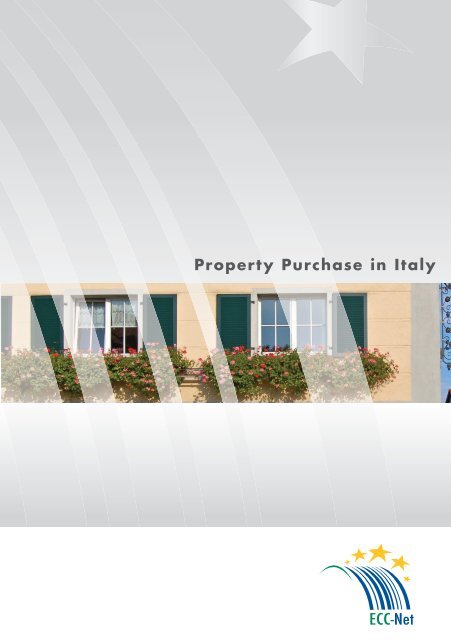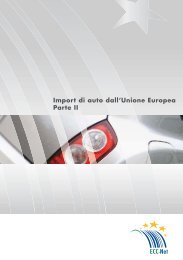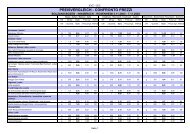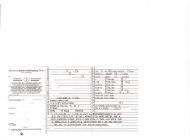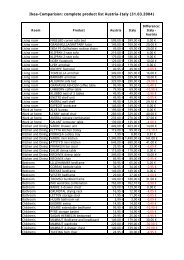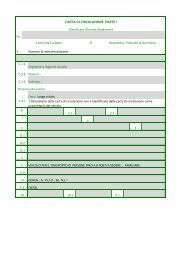Create successful ePaper yourself
Turn your PDF publications into a flip-book with our unique Google optimized e-Paper software.
Property Purchase in Italy
Published by<br />
European Consumer Centre Italy<br />
Bolzano Offi ce<br />
Via Brennero, 3<br />
I-39100 Bolzano - ITALY<br />
Tel. +39-0471-980939<br />
Fax +39-0471-980239<br />
www.euroconsumatori.org<br />
info@euroconsumatori.org<br />
Main Offi ce<br />
of <strong>the</strong> European Consumer Centre Italy<br />
ECC-Net Italy – Centro Europeo Consumatori<br />
Via G. M. Lancisi, 31<br />
00161 Roma – ITALY<br />
Tel. +39-06-44238090 - +39 06-44290734<br />
Fax +39-06-44118348<br />
www.ecc-netitalia.it<br />
info@ecc-net.it<br />
The European Consumer Centre Italy is co-funded by <strong>the</strong> Directorate-General<br />
for <strong>the</strong> Harmonization of <strong>the</strong> Market and Consumer protection of <strong>the</strong> Italian<br />
Ministry of Economic Development, by <strong>the</strong> Directorate-General for Health and<br />
Consumer Protection of <strong>the</strong> European Commission, by <strong>the</strong> Autonomous Province<br />
of Bolzano/Bozen and <strong>the</strong> Autonomous Region of Trentino-Alto Adige/Südtirol,<br />
and is a member of <strong>the</strong> network of European Consumer Centres ECC-Net.<br />
Host organisations are <strong>the</strong> consumers associations Centro Tutela Consumatori<br />
Utenti and Adiconsum.<br />
The information contained in this publication have been researched with <strong>the</strong><br />
utmost care. However, we cannot warrant or guarantee that it is free of error.<br />
The content of this <strong>brochure</strong> is intended to serve as simple guidance and not<br />
as all-encompassing information. For <strong>the</strong> in-depth information please resort<br />
directly to <strong>the</strong> competent institutions.<br />
Status: July 2008
TABLE OF CONTENTS:<br />
1) Introduction 4<br />
Italy - The Holiday Destination 4<br />
2) Prior to <strong>the</strong> Purchase 5<br />
a) General Information 5<br />
b) Important Checks 9<br />
c) The Estate Agent 9<br />
d) The Pre-Contract and <strong>the</strong> Earnest Money 11<br />
3) At <strong>the</strong> Time of Purchase 14<br />
a) The Notarially Certifi ed Purchase Deed 14<br />
b) Taxes 15<br />
c) Purchase from a Construction Company 19<br />
4) After <strong>the</strong> Purchase 21<br />
5) Useful Links 23
4<br />
1) Introduction<br />
Italy - The Holiday Destination<br />
Do you know <strong>the</strong> land where <strong>the</strong> lemon trees blossom?<br />
Among dark leaves <strong>the</strong> golden oranges glow.<br />
A gentle breeze from blue skies drifts.<br />
The myrtle is still, and <strong>the</strong> laurel stands high.<br />
Do you know it well?<br />
There, <strong>the</strong>re<br />
would I go with you, my beloved.<br />
J. W. Goe<strong>the</strong><br />
The Boot, as Italy is fondly called by its population, is a peninsula extending from<br />
<strong>the</strong> Alps to <strong>the</strong> Mediterranean Sea. The Italian coastline is more than 8,000 kilometres<br />
long and 80% of <strong>the</strong> national territory is covered by mountains and hills. It is this<br />
very diversity of landscapes which makes this country unique. This perfect balance<br />
of seaside and mountains, hills and plains as well as <strong>the</strong> temperate climate make<br />
Italy one of <strong>the</strong> most interesting and popular holiday destinations.<br />
Are you dreaming of your own home in this gorgeous country? Has this dream<br />
already come true? Then, this <strong>brochure</strong> will provide you with <strong>the</strong> information you<br />
need to become <strong>the</strong> happy owner or purchaser of your own home in Italy without<br />
any troubles and problems with <strong>the</strong> authorities or your neighbours and without any<br />
fi nancial losses.<br />
What are <strong>the</strong> risks involved in property transactions? How do you hire an estate<br />
agent? What is <strong>the</strong> agent’s commission? That’s just some of <strong>the</strong> questions consumers<br />
ask when it comes to buying or selling a fl at. Things get even more complicated if<br />
<strong>the</strong> property is not located in your home country. This brief guidebook will provide<br />
you with some useful information and pieces of advice for <strong>the</strong> purchase of property<br />
in Italy. For fur<strong>the</strong>r information on property purchase in Italy, please contact <strong>the</strong><br />
European Consumer Centre in Bolzano:<br />
http://www.euroconsumatori.org
2) Prior to <strong>the</strong> Purchase<br />
a) General Information<br />
Italian law differs from <strong>the</strong> national law of o<strong>the</strong>r countries in fundamental fi elds. This<br />
is particularly true for property law, law of succession and tax law. Lack of knowledge<br />
can <strong>the</strong>refore easily lead to misjudging <strong>the</strong> legal consequences of legal acts<br />
such as contracts or <strong>the</strong> consequences of tax liability.<br />
For this reason, property purchasers should always seek <strong>the</strong> advice of a conveyancer<br />
in order to avoid troubles with <strong>the</strong> purchase and subsequently enjoy peaceful<br />
ownership. Always bear in mind that <strong>the</strong> fi nal purchase deed has to be certifi ed by<br />
a notary public. Therefore, if you opt for an estate agent or a conveyancer to provide<br />
you with fi rst hand detailed legal information (in Italy, sometimes tax advisers<br />
also offer such services), don’t forget that in this case you’ll have to pay 2 fees (<strong>the</strong><br />
notary public’s fee and <strong>the</strong> fee of <strong>the</strong> estate agent or conveyancer). For this reason,<br />
it is advisable to contact an Italian notary public straightaway.<br />
On <strong>the</strong> offi cial site of Italian notaries (Consiglio Nazionale del Notariato), you can<br />
search for a notary public by surname, city or province:<br />
http://www.notariato.it/portal/site/notariato/menuitem.1a667003433f37133d<br />
118210b1918a0c/ ?vgnextoid=7eb08a18015cd010VgnVCM1000000a0a0a<br />
0aRCRD&vgnextfmt=semplice<br />
b) Important Checks<br />
The purchase of a house or a fl at is doubtless an event of outstanding importance in<br />
a person’s life. In most cases it implies a lot of stress. On no account let yourself be<br />
infected by “purchaser’s psychosis“, <strong>the</strong> fear of losing something you consider as a<br />
unique opportunity after a great many property inspections. If you sign a contract<br />
at a premature stage, you might disregard some of <strong>the</strong> precautions that you should<br />
always take in order to avoid a rude awakening.<br />
5
6<br />
Some investigations into <strong>the</strong> desired property are an absolute must<br />
before you sign a purchase deed. At any rate, always check on <strong>the</strong> following<br />
aspects before you sign <strong>the</strong> pre-contract or <strong>the</strong> fi nal purchase deed:<br />
1) Land Registry:<br />
In Italy, any properties are registered in <strong>the</strong> property register (Registri Immobiliari<br />
presso l’Uffi cio provinciale dell’Agenzia del Territorio – Ex-Conservatoria), more precisely<br />
in <strong>the</strong> register of <strong>the</strong> province in which <strong>the</strong> property is located. 1 The entry in <strong>the</strong><br />
register is made in <strong>the</strong> name of <strong>the</strong> person who performs <strong>the</strong> legal act linked to <strong>the</strong><br />
property (e.g. purchase deed, transfer by way of gift or succession). Therefore, if you<br />
want to know who <strong>the</strong> owner of <strong>the</strong> property is, you have to search for <strong>the</strong> name of<br />
<strong>the</strong> presumable owner.<br />
In particular, by inspecting <strong>the</strong> property register you obtain detailed information about<br />
<strong>the</strong> property, i.e. about ownership rights, any o<strong>the</strong>r rights and encumbrances, boundaries,<br />
surface area, basement units, attic and o<strong>the</strong>r secondary rooms, co-ownership<br />
rights, easements, etc. By obtaining an extract from <strong>the</strong> property register you get an<br />
overview of any legal transactions which took place in <strong>the</strong> preceding 20 years. 2<br />
Although <strong>the</strong> digitisation of <strong>the</strong> property register began in 1989, property research<br />
is not easy. 3 Consumers have 2 possibilities:<br />
a) seek <strong>the</strong> assistance of <strong>the</strong> notary public who is going to certify <strong>the</strong> fi nal purchase<br />
deed;<br />
1 In some Italian provinces (Bolzano, Trento, Trieste and Gorizia) properties and land are registered<br />
according to <strong>the</strong> land register system (libro fondiario). In this system, ownership rights as well as<br />
any o<strong>the</strong>r rights and encumbrances connected with <strong>the</strong> land or property are registered in a legally<br />
binding way and by property, not by <strong>the</strong> name of <strong>the</strong> owner.<br />
2 In Italy, <strong>the</strong> period of prescription for property is 20 years.<br />
3 As you have to check <strong>the</strong> legal transactions linked to <strong>the</strong> property of <strong>the</strong> preceding 20 years it may<br />
well be that <strong>the</strong>se transactions have not yet been digitised because legal transactions concluded<br />
before <strong>the</strong> year 1989 are only recorded in paper format. In addition, legal transactions concluded<br />
after <strong>the</strong> year 1989 may not be electronically accessible as not all municipalities started <strong>the</strong><br />
digitisation process at <strong>the</strong> same time and only those legal transactions were recorded which were<br />
concluded after <strong>the</strong> beginning of digitisation. Example: The municipality X started in 1993 to<br />
digitise its property register. A donation was made in 1990, and <strong>the</strong>refore it does not appear in<br />
<strong>the</strong> digital property register but is only recorded in <strong>the</strong> paper format register.
) seek <strong>the</strong> assistance of a company specialising in property register affairs, which<br />
will provide you with <strong>the</strong> extract from <strong>the</strong> property register and <strong>the</strong> necessary<br />
explanations, if desired.<br />
Always check <strong>the</strong> following information:<br />
- Ownership: Is <strong>the</strong> owner of <strong>the</strong> property a private individual or a company?<br />
In case <strong>the</strong> vendor is married, does he or she have community of property or<br />
separation of property? 4<br />
- Encumbrances: Is <strong>the</strong> property encumbered with mortgages, liens, easements,<br />
usufruct rights, seizures or o<strong>the</strong>r limitations?<br />
Attention:<br />
Attention:<br />
Mortgages have to be cancelled by <strong>the</strong> vendor or <strong>the</strong> involved<br />
bank prior to <strong>the</strong> sale of <strong>the</strong> property. Since June 2007, consumers<br />
haven’t had to seek <strong>the</strong> assistance of a notary public for mortgage<br />
cancellation anymore (if <strong>the</strong> loan has been repaid). For cancellation,<br />
a notice of <strong>the</strong> bank to <strong>the</strong> Uffi cio provinciale dell’Agenzia del<br />
territorio, i.e. to <strong>the</strong> property register, suffi ces. In this way, mortgages<br />
can be cancelled free of charge.<br />
Certain rights of third parties or impositions of certain conditions are<br />
not registered in <strong>the</strong> property register: Administrative conditions, for<br />
instance (e.g. <strong>the</strong> prohibition to erect buildings on a specifi c plot<br />
of land), can only be researched with <strong>the</strong> building authority of <strong>the</strong><br />
municipality in which <strong>the</strong> property is located. In addition, <strong>the</strong>re may<br />
be easements which are provided for by law.<br />
4 If <strong>the</strong> property is co-owned by spouses who are married in community of property, both spouses<br />
have to sign <strong>the</strong> fi nal purchase deed.<br />
7
8<br />
Attention:<br />
Attention:<br />
If you don’t know <strong>the</strong> vendor well or are in doubt about his or her<br />
solvency, <strong>the</strong> period between <strong>the</strong> pre-contract and <strong>the</strong> notarial<br />
purchase deed should be as short as possible and<br />
<strong>the</strong> deposit should be reduced to a minimum. Moreover,<br />
it is important to know that <strong>the</strong> purchaser always bears <strong>the</strong><br />
risk in <strong>the</strong> pre-contract phase. The vendor risks only later, if<br />
payment has not been made in full, yet, and <strong>the</strong> purchaser already<br />
occupies <strong>the</strong> fl at. It is recommendable to request a bank guarantee<br />
for payments which are made prior to <strong>the</strong> conclusion of <strong>the</strong> fi nal purchase<br />
deed. If you decide to buy a fl at from a construction company,<br />
this company is obliged by law to provide such bank guarantee for<br />
those properties for which a building permit was requested after 21<br />
July 2005 (see p. 19). However, it is also advisable to request such<br />
a bank guarantee when signing any o<strong>the</strong>r pre-contracts.<br />
2) Tax Checks<br />
In addition to <strong>the</strong> property register entry, properties in Italy are also registered in <strong>the</strong><br />
so-called cadastre (catasto) of <strong>the</strong> cadastre offi ce for tax reasons with <strong>the</strong> Agenzia<br />
del Territorio dei Registri Immobiliari (colloquially called catasto). The purpose of<br />
this register is to determine <strong>the</strong> so-called cadastral revenue (rendita catastale), which<br />
is <strong>the</strong> reference value to calculate <strong>the</strong> income tax payable by <strong>the</strong> owner.<br />
If <strong>the</strong> owner of a property who is registered in <strong>the</strong> so-called cadastre<br />
offi ce is not <strong>the</strong> same person as <strong>the</strong> owner stated in <strong>the</strong> property<br />
register, <strong>the</strong> latter is decisive: The rightful owner is <strong>the</strong> person registered<br />
in <strong>the</strong> property register. At any rate, any changes in property<br />
rights have to be reported to <strong>the</strong> catastre offi ce by <strong>the</strong> so-called<br />
voltura catastale. 5<br />
5 The voltura catastale is a form, which among o<strong>the</strong>r things contains <strong>the</strong> particulars of <strong>the</strong> new owner.<br />
In most cases <strong>the</strong> notary public who certifi es <strong>the</strong> purchase deed takes care of this notifi cation.
3) Fur<strong>the</strong>r Checks<br />
If you decide to purchase a fl at in a multi-family house, don’t forget to visit <strong>the</strong><br />
property manager: Ask for a copy of <strong>the</strong> rules of <strong>the</strong> house and enquire about<br />
<strong>the</strong> condition in which <strong>the</strong> property is and whe<strong>the</strong>r <strong>the</strong> previous owner paid all<br />
<strong>the</strong> utility bills in <strong>the</strong> preceding year. 6 Also ask whe<strong>the</strong>r <strong>the</strong>re are any pending<br />
court proceedings and whe<strong>the</strong>r extraordinary works were decided upon during<br />
<strong>the</strong> last few owners’ assemblies. Hardly anyone knows <strong>the</strong> property better than <strong>the</strong><br />
property manager.<br />
c) The Estate Agent<br />
Many consumers, due to language barriers and differences in <strong>the</strong> legal provisions<br />
and tax provisions between <strong>the</strong> country of origin and Italy, decide to seek <strong>the</strong><br />
assistance of an estate agent when purchasing property in Italy.<br />
Be cautious in this case:<br />
To practise <strong>the</strong> profession of an estate agent in Italy you need an offi cial permit, which<br />
is only issued to <strong>the</strong> agent if he or she proves professional qualifi cation. As <strong>the</strong>re are<br />
some “black sheep” in <strong>the</strong> real estate sector, it is advisable to convince yourselves<br />
of <strong>the</strong> seriousness of <strong>the</strong> estate agent before you sign any contracts. It is absolutely<br />
necessary to check whe<strong>the</strong>r <strong>the</strong> estate agent (agenzia immobiliare) has been properly<br />
registered in <strong>the</strong> respective register of <strong>the</strong> local chamber of commerce.<br />
As a rule, <strong>the</strong> commission rate is between 2% and 4% of <strong>the</strong> purchase price<br />
actually paid plus VAT and should be negotiated prior to <strong>the</strong> conclusion of <strong>the</strong> estate<br />
agent’s contract. Here, negotiating skills are useful.<br />
When hiring an estate agent, never content yourself with oral agreements, but always<br />
sign a written agreement in which you exactly state <strong>the</strong> desired purchase<br />
price of <strong>the</strong> home, <strong>the</strong> commission rate and <strong>the</strong> duration of <strong>the</strong> agreement. Don’t<br />
sign any clauses on implied continuation of <strong>the</strong> agreement.<br />
Many estate agents try to convince purchasers of <strong>the</strong> fact that it would be useful to<br />
sign a unilaterally binding promise to conclude a pre-contract or purchase<br />
deed (promessa unilaterale d’acquisto). However, this very common procedure implies<br />
some risks, and for this reason it is recommendable not to sign such promises.<br />
6<br />
Under Italian law, purchaser and vendor are obliged to pay <strong>the</strong> utilities for <strong>the</strong> current and <strong>the</strong><br />
preceding year.<br />
9
10<br />
Purchasers are well advised to sign only <strong>the</strong> pre-contract (possibly after having it<br />
examined by <strong>the</strong>ir personal lawyer). In fact, <strong>the</strong> unilaterally binding promise to sign<br />
a pre-contract or purchase deed binds <strong>the</strong> purchaser for a certain period of time to<br />
purchase a specifi c property if <strong>the</strong> potential vendor agrees.<br />
If you sign <strong>the</strong> unilaterally binding promise all <strong>the</strong> same, you should examine <strong>the</strong><br />
following facts in addition to <strong>the</strong> details stated in <strong>the</strong> written agreement:<br />
- <strong>the</strong> exact data on <strong>the</strong> owner and <strong>the</strong> property to be purchased;<br />
- <strong>the</strong> exact indication of <strong>the</strong> period of validity of <strong>the</strong> promise, <strong>the</strong> term for <strong>the</strong><br />
legal acceptance by <strong>the</strong> owner, how this acceptance is communicated and <strong>the</strong><br />
term for <strong>the</strong> reply.<br />
Some advice in case you opt for an estate agent:<br />
- If <strong>the</strong> agent accompanies you when you inspect a property and you subsequently<br />
decide to buy this property through his or her agency (<strong>the</strong> conclusion of<br />
a pre-contract suffi ces) you can assume you will have to pay <strong>the</strong> agent’s commission,<br />
even if you haven’t signed an agent’s contract.<br />
- If you are interested in a newspaper advertisement, fi nd out whe<strong>the</strong>r <strong>the</strong> phone<br />
number is <strong>the</strong> number of an estate agent. In this case, you’ll have to pay an<br />
agent’s commission. The conclusion of a pre-contract through <strong>the</strong> agency of an<br />
estate agent entitles <strong>the</strong> latter to charge a commission even if <strong>the</strong> purchase is not<br />
made.<br />
- Estate agents may charge you a fee for any contact. However, not every claim<br />
is necessarily justifi ed. When in doubt ask a consumer protection organisation<br />
for more detailed information.<br />
- If you want to sell a house or a fl at and get in touch with several estate agents:<br />
Be cautious, all of <strong>the</strong>m might charge a commission. However, not all of <strong>the</strong>m<br />
are necessarily entitled to receive such a commission. In this case, too, it is<br />
advisable to check <strong>the</strong> terms and conditions of your agent’s agreement and any<br />
fees that may be involved.
Attention:<br />
In <strong>the</strong> fi nal notarially certifi ed purchase deed you have to state<br />
whe<strong>the</strong>r an estate agent was involved in <strong>the</strong> purchase, whe<strong>the</strong>r he<br />
or she obtained a commission and how this commission was paid.<br />
You also have to state <strong>the</strong> tax payer’s reference number and <strong>the</strong> VAT<br />
number of <strong>the</strong> agent.<br />
d) The Pre-Contract and <strong>the</strong> Earnest Money<br />
In Italy, a pre-contract is usually signed before <strong>the</strong> conclusion of <strong>the</strong> notarial purchase<br />
deed. The pre-contract (compromesso di vendita or preliminare) is<br />
of particular importance as it sets <strong>the</strong> course for <strong>the</strong> subsequent purchase. The precontract<br />
is legally binding and in no way only provisional. For this reason, when<br />
signing <strong>the</strong> pre-contract, examine carefully whe<strong>the</strong>r it is clear who <strong>the</strong> vendor is and<br />
whe<strong>the</strong>r <strong>the</strong> vendor is in fact <strong>the</strong> (sole) person entitled to dispose of <strong>the</strong> property,<br />
whe<strong>the</strong>r all <strong>the</strong> required pieces of information on <strong>the</strong> property from <strong>the</strong> property<br />
register are available, which permits to use <strong>the</strong> property are available, which rights<br />
of preemption exist, how <strong>the</strong> deposit and <strong>the</strong> purchase price are to be paid ecc.<br />
(see page 5 - checks).<br />
Quite often, <strong>the</strong> estate agent signs <strong>the</strong> pre-contract on behalf of <strong>the</strong> vendor. Therefore,<br />
fi nd out whe<strong>the</strong>r <strong>the</strong> vendor has granted <strong>the</strong> estate agent such a power of<br />
attorney. Ask for a signed copy of this document. Before making any advance payments<br />
and/or signing <strong>the</strong> pre-contract, ask <strong>the</strong> legal adviser of your confi dence to<br />
examine <strong>the</strong> agreement and adapt it to meet your personal needs, if necessary.<br />
The pre-contract should contain <strong>the</strong> following content:<br />
- exact defi nition of <strong>the</strong> property, including secondary rooms and appurtenances;<br />
- exact statement of <strong>the</strong> particulars of <strong>the</strong> parties to <strong>the</strong> contract, taking into account<br />
<strong>the</strong> matrimonial property regime of married parties, in particular;<br />
- kind of deposit (usually confi rmation deposit);<br />
- exact indication of <strong>the</strong> purchase price and <strong>the</strong> terms of payment, <strong>the</strong> advance payments,<br />
instalments and <strong>the</strong> payment of balance of <strong>the</strong> purchase price, which as rule<br />
is made upon <strong>the</strong> signing of <strong>the</strong> notarial deed;<br />
- a clause on <strong>the</strong> delivery of possession of <strong>the</strong> property;<br />
- clauses on mortgages and conditions that are imposed on <strong>the</strong> property (with description<br />
of <strong>the</strong> mortgages and conditions to be cancelled);<br />
11
12<br />
- clauses concerning urban development provisions (<strong>the</strong> vendor has to make available<br />
<strong>the</strong> building permit, <strong>the</strong> certifi cate of habitability and applications for amnesty<br />
for work done without planning permission, if any);<br />
- delivery by <strong>the</strong> vendor of <strong>the</strong> property register and mortgage documents, <strong>the</strong> urban<br />
development documents, tenancy agreements, if any, <strong>the</strong> rules of <strong>the</strong> house with <strong>the</strong><br />
table of <strong>the</strong> ownership shares in thousandths.<br />
Earnest Money and Deposit<br />
In most cases <strong>the</strong> vendor or <strong>the</strong> estate agent will ask for a deposit (acconto) to “reserve”<br />
<strong>the</strong> fl at.<br />
Attention:<br />
Attention:<br />
Before you pay earnest money (caparra) or make a deposit, it is recommendable<br />
to seek <strong>the</strong> advice of a competent body, as <strong>the</strong> payment<br />
of any amount of money with <strong>the</strong> simultaneous signing of a contract<br />
already constitutes rights and duties for <strong>the</strong> parties to <strong>the</strong> contract. As<br />
a rule, <strong>the</strong> vendor demands a deposit in <strong>the</strong> amount of 20% of <strong>the</strong><br />
purchase price to be actually paid.<br />
The deposit is <strong>the</strong> payment of a portion of <strong>the</strong> fi nal purchase price. This has primarily<br />
consequences in terms of tax liability. If <strong>the</strong> fi nal purchase deed is not concluded,<br />
<strong>the</strong> deposit of <strong>the</strong> party which fails to perform can be retained, but no damages for<br />
non-performance can be claimed.<br />
The deposit is not decisive for <strong>the</strong> effects of <strong>the</strong> contract. The contract<br />
is already considered concluded at <strong>the</strong> time of <strong>the</strong> signing of <strong>the</strong> precontract<br />
by <strong>the</strong> parties.<br />
The situation is different with <strong>the</strong> so-called earnest money.<br />
A distinction is made between forfeit money and confi rmation deposit:<br />
Forfeit Money (caparra penitenziale): If a right of rescission is laid down in <strong>the</strong><br />
contract for one or both parties, <strong>the</strong> earnest money has <strong>the</strong> mere function of a compensation<br />
for <strong>the</strong> rescission of <strong>the</strong> contract. In this case, <strong>the</strong> party rescinding <strong>the</strong><br />
contract forfeits <strong>the</strong> earnest money or has to pay back twice <strong>the</strong> received amount.<br />
Fur<strong>the</strong>r claims for damages are excluded.
Confi rmation Deposit (caparra confi rmatoria): The performing party is entitled to<br />
damages and has <strong>the</strong> possibility to claim <strong>the</strong> fulfi lment of <strong>the</strong> contract (if necessary by<br />
means of a court decision) or to rescind <strong>the</strong> contract. In contrast to <strong>the</strong> forfeit money,<br />
<strong>the</strong> damages claimed can exceed <strong>the</strong> amount of <strong>the</strong> earnest money.<br />
If you are not sure about <strong>the</strong> purchase, it is recommendable to stipulate expressly <strong>the</strong><br />
possibility to rescind <strong>the</strong> contract in <strong>the</strong> pre-contract. In this case, your deposit will<br />
be retained as “forfeit money”. If you don’t comply with <strong>the</strong> provisions of <strong>the</strong> precontract,<br />
<strong>the</strong> o<strong>the</strong>r parties to <strong>the</strong> contract may not only retain your deposit but even<br />
claim damages in addition to that.<br />
The more time which passes between <strong>the</strong> pre-contract and <strong>the</strong> notarial<br />
deed, <strong>the</strong> higher <strong>the</strong> risk of <strong>the</strong> purchaser. This is also true for <strong>the</strong><br />
deposit, <strong>the</strong> amount of which is <strong>the</strong> highest risk for <strong>the</strong> purchaser.<br />
To avoid rude awakenings, in <strong>the</strong> year 1997 <strong>the</strong> possibility was introduced to register<br />
<strong>the</strong> pre-contract in <strong>the</strong> property register. This entry can be advantageous<br />
to <strong>the</strong> promising purchaser if <strong>the</strong> promising vendor (e.g. a construction company)<br />
declares itself bankrupt or if <strong>the</strong> purchaser is deceived by a vendor who wants<br />
to sell <strong>the</strong> property several times. In fact, <strong>the</strong> person who registers <strong>the</strong> pre-contract<br />
fi rst in <strong>the</strong> property register becomes <strong>the</strong> owner of <strong>the</strong> property.<br />
Attention:<br />
Attention:<br />
You need a notary public for <strong>the</strong> entry of <strong>the</strong> pre-contract in <strong>the</strong> property<br />
register (don’t forget to ask about <strong>the</strong> costs). The pre-contract must have<br />
<strong>the</strong> same form as <strong>the</strong> fi nal contract and contain <strong>the</strong> clauses and declarations<br />
required by law.<br />
The registration loses effect if <strong>the</strong> fi nal purchase deed is not registered<br />
in <strong>the</strong> property register within one year from <strong>the</strong> date set forth by <strong>the</strong><br />
parties in <strong>the</strong> pre-contract and within 3 years from <strong>the</strong> date of <strong>the</strong><br />
entry of <strong>the</strong> pre-contract, at <strong>the</strong> latest.<br />
On <strong>the</strong> home page of <strong>the</strong> Centro Tutela Consumatori Utenti (consumer organisation)<br />
you’ll fi nd a model pre-contract between private individuals and for <strong>the</strong> purchase<br />
of a property from a construction company:<br />
http://www.centroconsumatori.it/40v26401d1214.html<br />
13
14<br />
3) At <strong>the</strong> Time of Purchase<br />
a) The notarially certifi ed purchase deed<br />
As mentioned above, in Italy, property purchase deeds have to be signed in <strong>the</strong><br />
presence of a notary public.<br />
The task of <strong>the</strong> notary public is to assist <strong>the</strong> parties when <strong>the</strong>y conclude contracts of<br />
high economic value such as property contracts. The notary public has to examine<br />
whe<strong>the</strong>r <strong>the</strong> vendor is <strong>the</strong> owner of <strong>the</strong> fl at and whe<strong>the</strong>r <strong>the</strong> property is encumbered<br />
and has to explain to <strong>the</strong> parties all <strong>the</strong> details of <strong>the</strong> contract before <strong>the</strong>y sign it; <strong>the</strong><br />
notary public is liable for <strong>the</strong> inaccurate identifi cation of <strong>the</strong> parties or <strong>the</strong> property<br />
and for any encumbrances or conditions imposed on <strong>the</strong> property <strong>the</strong> parties were<br />
not aware of.<br />
As <strong>the</strong> parties have to know all <strong>the</strong> details of <strong>the</strong> contract, both <strong>the</strong> purchaser and<br />
<strong>the</strong> vendor need a good command of <strong>the</strong> Italian language (bear in mind that contracts<br />
contain many legal and technical terms, for which a very sound knowledge<br />
of <strong>the</strong> language is required). Contracts may also be concluded before a notary<br />
public with <strong>the</strong> assistance of an interpreter (ask about possible additional costs). 7<br />
7 Following a ruling of <strong>the</strong> Trento Higher Regional Court, Bolzano Branch, in 2004 <strong>the</strong> possibility<br />
was reintroduced to have private contracts, such as purchase contracts, partition contracts,<br />
property exchange contracts and servitude contracts certifi ed by Austrian notaries public if<br />
<strong>the</strong> property involved is located in those Italian provinces in which properties are registered<br />
according to <strong>the</strong> land register system (see p. 6). However, <strong>the</strong> Austrian notary public certifi es<br />
exclusively <strong>the</strong> signatures of <strong>the</strong> parties and not <strong>the</strong> contents of <strong>the</strong> contract. For this reason it is<br />
higly recommended to have <strong>the</strong> private contract (i.e. <strong>the</strong> fi nal contract) drawn up in advance by a<br />
lawyer of your confi dence as <strong>the</strong> contents of <strong>the</strong> contract have to be examined with utmost care.<br />
The advantage of having <strong>the</strong> signatures of <strong>the</strong> purchase deed certifi ed by an Austrian notary<br />
public is <strong>the</strong> lower cost (only about 30 to 170 euros per signature depending on <strong>the</strong> value of <strong>the</strong><br />
property).
PAYMENT OF THE PURCHASE PRICE<br />
In most cases, <strong>the</strong> entire purchase price or <strong>the</strong> balance of this amount (if a deposit<br />
was made) is paid at <strong>the</strong> time of <strong>the</strong> signing of <strong>the</strong> contract. The terms of payment<br />
have to be exactly specifi ed in <strong>the</strong> purchase deed: date of <strong>the</strong> payment, amount,<br />
and means of payment (e.g. by non-transferable banker’s draft or cash cheque, by<br />
bank transfer ecc.). 8<br />
Attention:<br />
cash payments exceeding 12,500.00 euros are not allowed.<br />
After <strong>the</strong> certifi cation of <strong>the</strong> contract, <strong>the</strong> notary public arranges for <strong>the</strong> registration<br />
of <strong>the</strong> transfer of property in <strong>the</strong> land or property register.<br />
The Notary Public’s Fee<br />
The notary public’s fee depends on <strong>the</strong> purchase price.<br />
On <strong>the</strong> following website, you’ll fi nd an overview of <strong>the</strong> notarial fees Italian<br />
notaries charge for property contracts:<br />
http://www.notariato.it/portal/site/notariato/menuitem.faf871f13f8e37133d118<br />
210b1918a0c/ ?vgnextoid=c2f581f66241e010VgnVCM1000009601010aRCR<br />
D&vgnextchannel=1e19f04f1f66c010VgnVCM1000000100007fRCRD<br />
b) Taxes<br />
When concluding property contracts in Italy, you always have to pay registration,<br />
mortgage and cadastre fees.<br />
Property acquisition tax is immediately payable upon <strong>the</strong> notarial certifi cation of <strong>the</strong><br />
purchase deed. This tax has to be directly transferred to <strong>the</strong> notary public toge<strong>the</strong>r<br />
with <strong>the</strong> fee.<br />
Until recently, <strong>the</strong> parties to <strong>the</strong> contract frequently stated a lower price than <strong>the</strong><br />
8 Among o<strong>the</strong>r things <strong>the</strong> number and <strong>the</strong> amount of <strong>the</strong> banker’s draft or cash cheque or <strong>the</strong> account<br />
number of <strong>the</strong> account to which <strong>the</strong> purchase price was transferred have to be indicated.<br />
15
16<br />
actual price in <strong>the</strong> fi nal purchase deed to “save taxes”. 9 Since <strong>the</strong> beginning of<br />
2006, property acquisition tax is no longer calculated on <strong>the</strong> basis of <strong>the</strong> offi cially<br />
stated purchase price but according to <strong>the</strong> considerably lower cadastral value of <strong>the</strong><br />
property. 10<br />
A Brief Tax Overview:<br />
Taxes payable by <strong>the</strong> purchaser for fi rst homes: 11<br />
Taxes The vendor is a private<br />
individual<br />
Taxes The vendor is a private<br />
individual<br />
The vendor is<br />
a company<br />
VAT no VAT 4%*<br />
Registration fee 3%* 168,00 euros<br />
Mortgage fee 168,00 euros 168,00 euros<br />
Cadastre fee 168,00 euros 168,00 euros<br />
Taxes payable by <strong>the</strong> purchaser for second homes:<br />
The vendor is<br />
a company<br />
VAT no VAT 10%*<br />
Registration fee 7%* 168,00 euros<br />
Mortgage fee 2%* 168,00 euros<br />
Cadastre fee 1%* 168,00 euros<br />
* The percentage refers to <strong>the</strong> cadastral value<br />
9 Until <strong>the</strong> end of 2005, property acquisition tax was calculated on <strong>the</strong> basis of <strong>the</strong> offi cially<br />
declared purchase price.<br />
10 To calculate <strong>the</strong> cadastre value (valore catastale) of a property, <strong>the</strong> cadastre revenue (rendita catastale),<br />
increased by 5%, is multiplied by a specifi c coeffi cient (e.g. 110 for fi rst homes). You can fi nd <strong>the</strong><br />
coeffi cients on <strong>the</strong> following home page:<br />
http://www.agenziaentrate.it/ilwwcm/resources/fi le/eb89fa0f81e024e/annuario2007_new.pdf<br />
11 For tax reliefs for fi rst homes see p. 17.
Foreign consumers planning to purchase a property in Italy need an Italian tax<br />
payer’s reference number, which is issued exclusively by <strong>the</strong> Italian Revenue<br />
Agency (Agenzia delle Entrate). Non-residents of Italy have to apply for <strong>the</strong> tax payer’s<br />
reference number with <strong>the</strong> Italian consulate of <strong>the</strong>ir country of residence.<br />
For fur<strong>the</strong>r information see <strong>the</strong> tax guide for non-residents of <strong>the</strong> Italian Revenue<br />
Agency:<br />
http://www.agenziaentrate.it/ilwwcm/resources/fi le/eb82a80af83e41d/guida_italianoINTERNET.pdf<br />
Tax reliefs for fi rst homes<br />
Frequently <strong>the</strong> vendor recommends <strong>the</strong> purchaser to transfer his or her principal<br />
residence to Italy to benefi t from <strong>the</strong> lower purchasing costs. However, you should<br />
thoroughly examine whe<strong>the</strong>r this is really advantageous as it has major legal and<br />
tax implications. It is <strong>the</strong>refore important to carefully assess <strong>the</strong> overall situation in<br />
every individual case. In addition, <strong>the</strong> authorities examine whe<strong>the</strong>r this principal<br />
residence really exists. A wrong decision can have unfavourable long-term fi nancial<br />
consequences.<br />
The benefi t consists of <strong>the</strong> reduction in various fees: <strong>the</strong> registration fee is 3% 12 of <strong>the</strong><br />
cadastral value of <strong>the</strong> property, <strong>the</strong> mortgage fee amounts to 168.00 euros and <strong>the</strong><br />
registration fee is 168.00 euros. The property must not have any characteristics of<br />
a luxury home (<strong>the</strong>se characteristics were defi ned by Ministerial Decree of 2 August<br />
1969). 13<br />
Example:<br />
The cadastral value of <strong>the</strong> property is 70.000 Euro.<br />
If you purchase <strong>the</strong> property as a second home from a private individual, you’ll<br />
have to pay <strong>the</strong> following taxes: 7% registration fee = 4,900 euros + 2% mortgage<br />
fee = 1,400 euros + 1% cadastre fee = 700 euros, i.e. 7,000 euros in taxes in total<br />
(10% of <strong>the</strong> cadastral value).<br />
12 The cadastre value of <strong>the</strong> property is used as <strong>the</strong> basis for <strong>the</strong> calculation of <strong>the</strong> registration fee<br />
– see page 15.<br />
13 The text of <strong>the</strong> Ministerial Decree is available on <strong>the</strong> following website: http://www.sicet.it/<br />
normativa/decreti/DM/DM_2-8-69.htm<br />
17
18<br />
On <strong>the</strong> o<strong>the</strong>r hand, if you purchase <strong>the</strong> property as a fi rst home from a private<br />
individual, you’ll have to pay <strong>the</strong> following taxes: 3% registration fee = 2,100 euros +<br />
mortgage fee of 168 euros + cadastre fee of 168 euros, totalling 2,436 euros.<br />
You also get tax benefi ts on <strong>the</strong> purchase of appurtenances (such as basement units,<br />
attics, garages, roofs and parking spaces) if <strong>the</strong>y are purchased toge<strong>the</strong>r with or<br />
following <strong>the</strong> purchase of <strong>the</strong> tax-privileged fl at. The tax relief applies to only one appurtenance<br />
per category (it is possible to purchase one garage and one basement<br />
unit, but not a double garage or a double basement unit).<br />
The purchasers have to be natural persons buying <strong>the</strong> property in <strong>the</strong>ir municipality<br />
of residence or alternatively in <strong>the</strong> municipality in which <strong>the</strong>y have <strong>the</strong>ir workplace.<br />
Thus, <strong>the</strong> basic requirement is that you have your place of residence or your workplace<br />
in <strong>the</strong> municipality in which <strong>the</strong> property is located or that you carry out your<br />
activity in this municipality. In circular no. 1/e of 2 March 1994, <strong>the</strong> Italian Revenue<br />
Agency specifi ed that any activities are included, i.e. also activities without remuneration<br />
such as voluntary work, sports activities, studies ecc. (in <strong>the</strong>se cases you’ll<br />
have to produce <strong>the</strong> relating certifi cates).<br />
Attention:<br />
You are granted a term of 18 months from <strong>the</strong> signing of <strong>the</strong> purchase<br />
deed to transfer your place of residence (residenza) to <strong>the</strong><br />
municipality you live or work in (domicilio).<br />
In order to enjoy <strong>the</strong> tax privileges for fi rst homes you have to make<br />
several declarations:<br />
1) That you don’t own any o<strong>the</strong>r suitable home in <strong>the</strong> municipality (not even toge<strong>the</strong>r<br />
with your spouse) in which you apply for tax relief.<br />
2) That you don’t have, because of your marriage in community of property, an<br />
interest in any property rights, usufruct rights, rights of use, residential rights or<br />
property rights without use (nuda proprietà) with regard to any fl ats for <strong>the</strong> purchase<br />
of which you or your spouse were granted fi rst home tax privileges. This<br />
applies for <strong>the</strong> entire national territory.<br />
3) That you intend to establish your place of residence in <strong>the</strong> municipality in which<br />
<strong>the</strong> property to be purchased is located (unless you already live or work <strong>the</strong>re).<br />
You can also apply for tax relieves for <strong>the</strong> purchase of property rights without use<br />
(nuda proprietà) or usufruct rights provided that <strong>the</strong> fl at fulfi lls <strong>the</strong> requirements and<br />
is located in <strong>the</strong> municipality of your residence. In addition, you can receive tax
privileges for a fl at which is rented, provided that it fulfi lls <strong>the</strong> requirements and is<br />
located in <strong>the</strong> municipality of your residence.<br />
Subsidies for <strong>the</strong> repurchase of a fi rst home:<br />
Since 1999, anyone selling or donating a subsidized fl at and purchasing a new<br />
fl at which is eligible to tax relief within one year, benefi ts from a tax relief (credito<br />
d’imposta). This tax relief is equal to <strong>the</strong> tax paid on <strong>the</strong> fi rst purchase and must not<br />
exceed this amount.<br />
In order to be eligible for tax relief <strong>the</strong> following terms and conditions have to<br />
be complied with:<br />
1) <strong>the</strong> sold fl at has to be a subsidized fl at;<br />
2) <strong>the</strong> subsidized fl at was sold or donated after 1 January 1998 (e.g. parents<br />
donate <strong>the</strong>ir children a fl at and buy a new one);<br />
3) <strong>the</strong> new fl at can only be acquired by purchase or exchange and only within<br />
one year from <strong>the</strong> sale of <strong>the</strong> fi rst fl at.<br />
You’ll fi nd more detailed information on tax relieves for fi rst homes on <strong>the</strong><br />
following web site:<br />
http://www1.agenziaentrate.it/modulistica/dichiarazione/1999/unico99/760/<br />
iperguida/modelli/appendice/app01new.htm<br />
c) Purchase from a Construction Company<br />
Bank guarantee and construction defects insurance<br />
Since 21 July 2005, construction companies are obliged, among o<strong>the</strong>r things, to<br />
issue a construction defects insurance policy with a 10 year term of validity<br />
on behalf of <strong>the</strong> purchasers and to give <strong>the</strong>m a bank guarantee in <strong>the</strong> amount of<br />
<strong>the</strong> deposits and instalments which is valid until <strong>the</strong> fi nal purchase deed is signed.<br />
This rule applies only for construction companies which applied for <strong>the</strong> building<br />
permit after 21 July 2005. Purchasers who don’t benefi t from <strong>the</strong>se new provisions<br />
are advised to ask for a bank guarantee in <strong>the</strong> contract to protect <strong>the</strong>m in case of a<br />
bankruptcy of <strong>the</strong> construction company.<br />
If no bank guarantee was furnished, it is advisable to pay <strong>the</strong> balance of <strong>the</strong> purchase<br />
price only upon <strong>the</strong> signing of <strong>the</strong> fi nal notarial purchase deed. If you pay<br />
by cheque you should preferably issue it directly to <strong>the</strong> vendor. At any rate, always<br />
(also when making <strong>the</strong> deposit) ask <strong>the</strong> estate agent or <strong>the</strong> vendor to sign and<br />
hand you a confi rmation of payment. You should always make a photocopy of any<br />
cheques you issue.<br />
19
20<br />
Housing Construction and Bankruptcy of <strong>the</strong> Construction Company:<br />
What are <strong>the</strong> risks?<br />
The worst case is beyond doubt <strong>the</strong> possible bankruptcy of <strong>the</strong> construction company<br />
with <strong>the</strong> resulting risk of losing <strong>the</strong> purchased property in <strong>the</strong> course of <strong>the</strong><br />
so-called “action for revocation” (azione revocatoria). According to <strong>the</strong> Bankruptcy<br />
Act, with this action, which is fi led against <strong>the</strong> purchaser, <strong>the</strong> judge can declare<br />
null and void <strong>the</strong> sale of a property if it took place in <strong>the</strong> two years preceding <strong>the</strong><br />
declaration of bankruptcy. The property can be sold by auction and <strong>the</strong> proceeds<br />
can be used to pay off <strong>the</strong> creditors.<br />
Only <strong>the</strong> fi nal purchase deed and not <strong>the</strong> pre-contract can be revoked. In fact, while<br />
after <strong>the</strong> signing of <strong>the</strong> pre-contract <strong>the</strong> fl at remains <strong>the</strong> property of <strong>the</strong> company,<br />
<strong>the</strong> ownership of <strong>the</strong> fl at is transferred to <strong>the</strong> new owner/purchaser with <strong>the</strong> fi nal<br />
purchase deed. Thus, <strong>the</strong> company can suffer a concrete damage only with <strong>the</strong><br />
defi nite transfer.<br />
Independent of <strong>the</strong> above-mentioned, both <strong>the</strong> prospective purchaser, who paid<br />
deposits, and <strong>the</strong> defi nite owner, who paid <strong>the</strong> company <strong>the</strong> entire sales price, bear<br />
<strong>the</strong> mentioned risk if <strong>the</strong> purchase was made within <strong>the</strong> two years preceding <strong>the</strong><br />
declaration of bankruptcy. The former paid <strong>the</strong> bankrupt company a portion of <strong>the</strong><br />
purchase price in advance and is unlikely to get this money back. The latter may<br />
lose <strong>the</strong> property, whose owner he or she has already become, and may <strong>the</strong>refore<br />
have to repurchase it at <strong>the</strong> auction of <strong>the</strong> bankrupt’s estate or, alternatively, he or<br />
she becomes a creditor.<br />
Attention:<br />
Those who signed only a pre-contract have had <strong>the</strong> possibility for<br />
several years now to register this agreement in <strong>the</strong> property register.<br />
In this way you become a so-called preferential creditor if <strong>the</strong><br />
construction company goes bankrupt, i.e. a creditor ranking before<br />
o<strong>the</strong>r creditors when it comes to distributing <strong>the</strong> assets of <strong>the</strong> bankrupt<br />
company (see page 13)<br />
Ano<strong>the</strong>r solution is to make sure that <strong>the</strong> construction company concludes a bank<br />
guarantee or an insurance policy which protects <strong>the</strong> purchaser against an action<br />
for revocation or in case <strong>the</strong> company goes bankrupt. The purchaser might offer to<br />
bear <strong>the</strong> costs of such a policy.<br />
There is also <strong>the</strong> possibility to fi le an application with <strong>the</strong> Solidarity Fund in case<br />
<strong>the</strong> construction company went bankrupt in <strong>the</strong> period between 31 December 1993<br />
and 21 July 2005. For fur<strong>the</strong>r information and <strong>the</strong> application form see:<br />
http://www.confedilizia.it/EVI_D.M.2.2.2006.html
4) After <strong>the</strong> Purchase<br />
After <strong>the</strong> signing of <strong>the</strong> purchase deed <strong>the</strong> “new“ owner has to take care of fur<strong>the</strong>r<br />
issues such as water, electricity supply, waste and telephone.<br />
Electricity Supply<br />
Since 1 July 2007, Italian households have been free to shop around for electricity<br />
suppliers and to change from <strong>the</strong> current supplier to a new one. If no new supplier<br />
is chosen, electricity continues to be supplied by <strong>the</strong> existing one on <strong>the</strong> standard<br />
terms as defi ned by <strong>the</strong> supervisory authority.<br />
For this contract, you just need a copy of your tax payer’s reference number and your ID.<br />
Gas<br />
There are several gas suppliers in Italy, most of <strong>the</strong>m at <strong>the</strong> level of <strong>the</strong> provinces.<br />
However, <strong>the</strong>re are also some suppliers in <strong>the</strong> individual municipalities. Therefore,<br />
ask <strong>the</strong> local suppliers for detailed information about new connections and contract<br />
assumption and renewal.<br />
For a new connection, most suppliers request <strong>the</strong> bill of ano<strong>the</strong>r utility company (e.g.<br />
electricity or telephone), a self-declaration of <strong>the</strong> compliance of <strong>the</strong> fl at with urban<br />
development provisions and a declaration of <strong>the</strong> proper functioning of <strong>the</strong> heating<br />
system (issued by <strong>the</strong> technician who installed <strong>the</strong> system).<br />
In case of <strong>the</strong> assumption of a contract, gas suppliers often ask for a recent bill of <strong>the</strong><br />
preceding consumer as well as <strong>the</strong> cancellation of <strong>the</strong> registration of <strong>the</strong> connection.<br />
Waste<br />
The new owner has to inform <strong>the</strong> competent authority in <strong>the</strong> municipality in which<br />
<strong>the</strong> property is located of <strong>the</strong> fact that he or she is <strong>the</strong> new owner. In addition to<br />
your personal data (fi rst name and surname, date of birth) you have to state your<br />
tax payer’s reference number. Moreover, you have to fi ll in a form with <strong>the</strong> data of<br />
your property: address, number of rooms, square metres, number of occupants, use<br />
of <strong>the</strong> property.<br />
Water<br />
If your “new“ fl at is located in a “condominio“ (multi-family house) you usually<br />
don’t have to give any notifi cations regarding water supply: In most cases <strong>the</strong> contract<br />
is issued to <strong>the</strong> condominio. For fur<strong>the</strong>r information ask <strong>the</strong> property manager.<br />
However, if you purchased a property from a previous owner who had an individual<br />
contract for water supply, you have to obtain and fi ll in a form with <strong>the</strong> competent<br />
body stating that you have taken over <strong>the</strong> contract in your own name.<br />
In case of a new building you have to apply for a new water supply and conclude<br />
<strong>the</strong> relating contract.<br />
21
22<br />
Telephone<br />
The liberalisation of <strong>the</strong> telephone market makes it possible also for private consumers<br />
to choose among various service providers. It is currently possible to choose<br />
a different provider than Telecom Italia for <strong>the</strong> local, regional and international<br />
network.<br />
However, in many places Telecom Italia still has a monopoly on <strong>the</strong> so called “last<br />
mile“. 14 Recently it has become possible, though, to terminate <strong>the</strong> contract with<br />
Telecom Italia and conclude new contracts with cheaper companies. However, this<br />
possibility is limited to <strong>the</strong> cities and to only some streets <strong>the</strong>re.<br />
Any companies offering <strong>the</strong>ir services as an alternative to Telecom Italia currently<br />
don’t bill any basic charges. In addition, <strong>the</strong>y provide perfectly transparent documentation<br />
of your personal phone usage. The telephone service is currently almost<br />
exclusively offered by means of a set monthly fee. In general, <strong>the</strong> actual duration<br />
of <strong>the</strong> phone calls is charged. The same system is applied by Telecom Italia.<br />
Attention:<br />
O<strong>the</strong>r providers charge fees for <strong>the</strong> telephone connection, too.<br />
There will always be some kind of charging, ei<strong>the</strong>r called “monthly<br />
minimum“ or hidden in <strong>the</strong> rates.<br />
On <strong>the</strong> internet you can quickly and easily get an overview of <strong>the</strong> offers on <strong>the</strong><br />
telephone market and choose <strong>the</strong> most convenient solution meeting your needs<br />
among <strong>the</strong> various providers.<br />
You can calculate <strong>the</strong> rates online:<br />
http://www.provincia.bz.it/phonerate/phone_i.aspx<br />
It is also possible to conclude new telephone service contracts by phone. The<br />
numbers of <strong>the</strong> most important providers are:<br />
Telecom – 187<br />
Wind–Infostrada – 155<br />
Tele2 – 848 99 1022<br />
Tiscali – 800 901 00 91<br />
14 In reality, Telecom Italia has stayed <strong>the</strong> monopolist of <strong>the</strong> telephone lines as <strong>the</strong> o<strong>the</strong>r providers<br />
use <strong>the</strong> lines of Telecom, paying <strong>the</strong> latter a charge.
Useful links<br />
European Consumer Centre Italy, Bolzano offi ce:<br />
www.euroconsumatori.org<br />
Offi cial Site of Italian Notaries:<br />
http://www.notariato.it<br />
Homepage of <strong>the</strong> South Tyrolean Consumer Centre – model of a pre-contract between private<br />
individuals and for <strong>the</strong> purchase of a property from a construction company:<br />
http://www.centroconsumatori.it/40v26401d1214.html<br />
Overview of <strong>the</strong> notarial fees Italian notaries public charge for property contracts:<br />
http://www.notariato.it/portal/site/notariato/menuitem.faf871f13f8e37133d118210b1918<br />
a0c/ ?vgnextoid=c2f581f66241e010VgnVCM1000009601010aRCRD&vgnextchannel=1e1<br />
9f04f1f66c010VgnVCM1000000100007fRCRD<br />
Tax Guide of <strong>the</strong> Italian Revenue Agency for Non-Residents:<br />
http://www.agenziaentrate.it/ilwwcm/resources/fi le/eb82a80af83e41d/guida_<br />
italianoINTERNET.pdf<br />
Information on Tax Reliefs for First Homes:<br />
http://www1.agenziaentrate.it/modulistica/dichiarazione/1999/unico99/760/iperguida/<br />
modelli/appendice/app01new.htm<br />
Information on <strong>the</strong> Solidarity Fund for bankruptcies of construction companies in <strong>the</strong> period<br />
from 31 December 1993 to 21 July 2005:<br />
http://www.confedilizia.it/EVI_D.M.2.2.2006.html<br />
Online Calculator of Telephone Costs:<br />
http://www.provincia.bz.it/phonerate/index_d.asp<br />
23
Published by<br />
European Consumer Centre Italy<br />
Bolzano Offi ce<br />
Via Brennero, 3<br />
I-39100 Bolzano - ITALY<br />
Tel. +39-0471-980939<br />
Fax +39-0471-980239<br />
www.euroconsumatori.org<br />
info@euroconsumatori.org<br />
Main Offi ce<br />
of <strong>the</strong> European Consumer Centre Italy<br />
ECC-Net Italy – Centro Europeo Consumatori<br />
Via G. M. Lancisi, 31<br />
00161 Roma – ITALY<br />
Tel. +39-06-44238090<br />
+39-06-44290734<br />
Fax +39-06-44118348<br />
www.ecc-netitalia.it<br />
info@ecc-net.it<br />
Ministerium für die<br />
Wirtschaftliche Entwicklung<br />
DGAMTC<br />
DG SANCO<br />
Autonome Provinz Bozen


